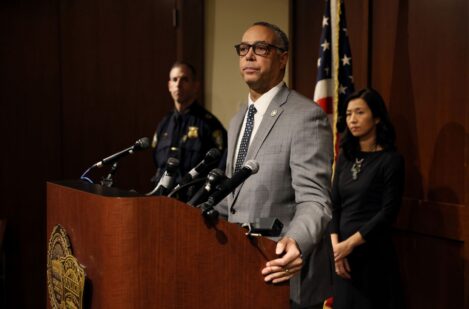Hayden announced a pilot program for young people 18-25 at a panel with nonprofit More Than Words.
By Ivy Scott, Globe Staff, April 27, 2023, 8:42 p.m.

Suffolk District Attorney Kevin Hayden on Thursday announced a new diversion program for young adults ages 18 to 25 that his office plans to launch this summer in the Dorchester Division of Boston Municipal Court.
“The goal is always to keep kids out of the system and give them the opportunity to succeed,” Hayden said. “I wouldn’t be doing this if I didn’t think it was going to work. I know it’ll work, and I believe in very short order we’ll go from Dorchester to Roxbury to Chelsea, and then all through Suffolk County.”
Hayden introduced the diversion program in a panel discussion at More Than Words, a nonprofit bookstore in Boston run by young adults. In addition to operating the bookstore, the nonprofit supports young adults in the foster care system, or who struggle with homelessness or entanglement in the criminal justice system.
Hayden was joined on the panel by Dr. Robert Kinscherff from Harvard’s Center for Law, Brain, & Behavior and Lael Chester from the Columbia University Justice Lab, as well as several young adults.
Chester shared highlights from a new report released by The Justice Lab Thursday on young adult justice entitled “Promising Practices: Pre-Arraignment Diversion for Emerging Adults.” The report summarizes 13 best practices for designing young adult diversion programs, including allowing a young person to be diverted out of the system for multiple incidents, and tailoring services to “the unique needs and interests of each emerging adult.”
Duci Goncalves, head of the Committee for Public Counsel Services Youth Advocacy Division, stressed the importance of collaboration for a successful long-term approach.
“We all want the same things: we want our young adults to be successful, and we want our communities to be safe… [but] if we pour into our communities, that is public safety,” said Goncalves, who was also on the panel. “It’s so easy to get sucked into the system and once you’re in, there’s all these collateral consequences. It interferes with your ability to go to college, to get a job, housing, so many things that trickle down from even stepping foot into the courthouse.”
No one was more supportive of diversion than the young adults on the panel.
Mischael Morency, 24, who is enrolled in a mentoring program at Roca Boston, said he is excited about the expansion of a diversion program in the city.
“All that wasn’t attainable when I needed it, and it delayed my ability to do things like go to college,” said Morency, who is studying business management and finance at the University of Massachusetts Boston with dreams of working in real estate and serving as a mentor to other young men.
“Especially as Black men, we often learn that there’s only one way to express our emotions, and that’s anger,” Morency said. “So it’s awesome to see what will be possible for other guys who look like me in the future.”
The Suffolk County program will feature both pre-arraignment diversion for first-time offenders or young people with a “limited” criminal record, and pre-sentencing diversion for more serious offenses, Hayden said. Successful participants in the pre-arraignment program will never see the charge for which they were arrested appear on their record, while people who complete the pre-sentencing program will have their sentence reduced or, in some situations, their case dismissed entirely.
Hayden said his goal is to “tailor the services being provided and to tailor the timeframe” to the individual.
Some young adults might need nine months in the program while others hit their stride in three, he said.
Young people will also receive a physical wellness check “right off the bat,” he said, which can tell the office some of the individual’s most urgent needs, such as access to stable housing or substance use counseling.
Like the office’s Juvenile Alternative Resolution program, started in 2017, the program will focus on accountability, wellness, and transition out of the justice system.
“The focus will be on pre-arraignment, but we don’t want to limit someone who does get arraigned,” Hayden said, adding that youth outreach organizations such as More Than Words and nonprofit Roca “can make a real difference in someone’s life, and that shouldn’t end just because they get arraigned.”
Read the full Boston Globe article here.



